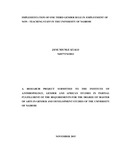| dc.description.abstract | The framers of Kenya’s new Constitution provides an affirmative action where the state is
required to take legislative and other measures to ensure that no more than two-thirds of
the members of elective or appointive bodies are of the same gender. State agencies and
private institutions are working towards implementing what has come to be referred to as
a third gender rule. The Ministry of Education, Science and Technology signed a
Performance contract with University of Nairobi requiring them to provide information
regarding appointments, promotion and employment of staff for the purpose of
benchmarking on compliance level of the a third gender rule of at the Institution. This study
will be helpful to academicians and other stakeholders by providing literature on gender
and equality and employment of staff in University of Nairobi. The objectives of the study
were: (i) evaluate the extent to which the third gender rule has been implemented in the
employment of non-teaching staff in The University of Nairobi (ii) determine the effect of
implementation of the a third gender rule in the University of Nairobi and (iii) establish the
perceptions and practices of employees with regard to implementation of a third gender
rule in employment of staff in the University of Nairobi. This study utilized a descriptive
research design which primarily utilized qualitative research methods and was complemented by
semi structured questionnaire. A total of 65 semi structured interviews was conducted, four
(4) Focus group discussion, nine (9) Key Informant interview guide, and secondary sources
were used to gather information. This yielded both qualitative and quantitative data.
Quantitative data was analyzed using SPSS that yielded frequency tables while qualitative
narratives were analyzed using content analysis. The study findings indicated that a third
gender rule was not being implemented to the later in the University despite that there is
high level of awareness among non-teaching staff and administrators, this has not been
translated to effective implementation of a third gender rule. This has been attributed to
nepotism, male chauvinism, culture and inadequate finances acted as the hindrance to the
implementation of the gender rule. The study concludes that new policies and procedures
needed to be formulated to fill the loopholes where redundancies in the implementation of
a third gender rule have been observed. | en_US |

